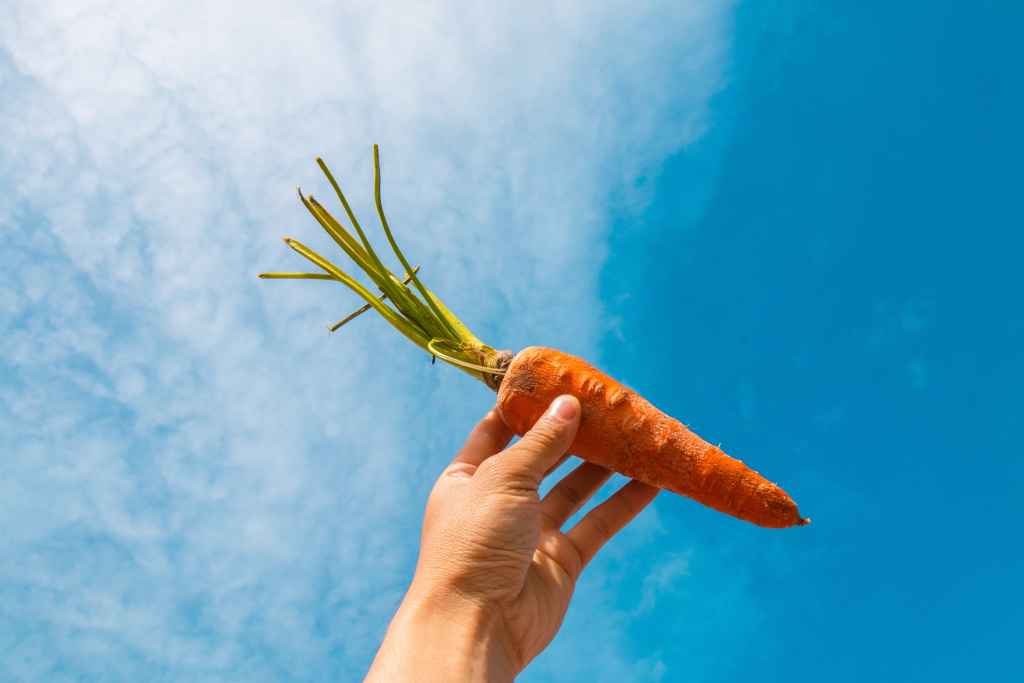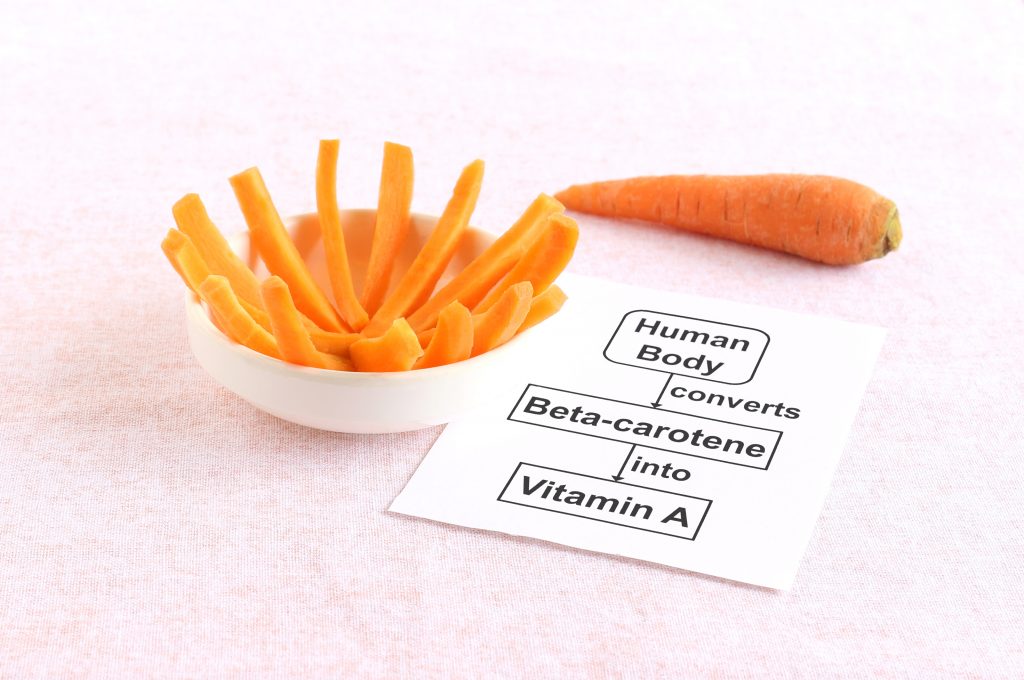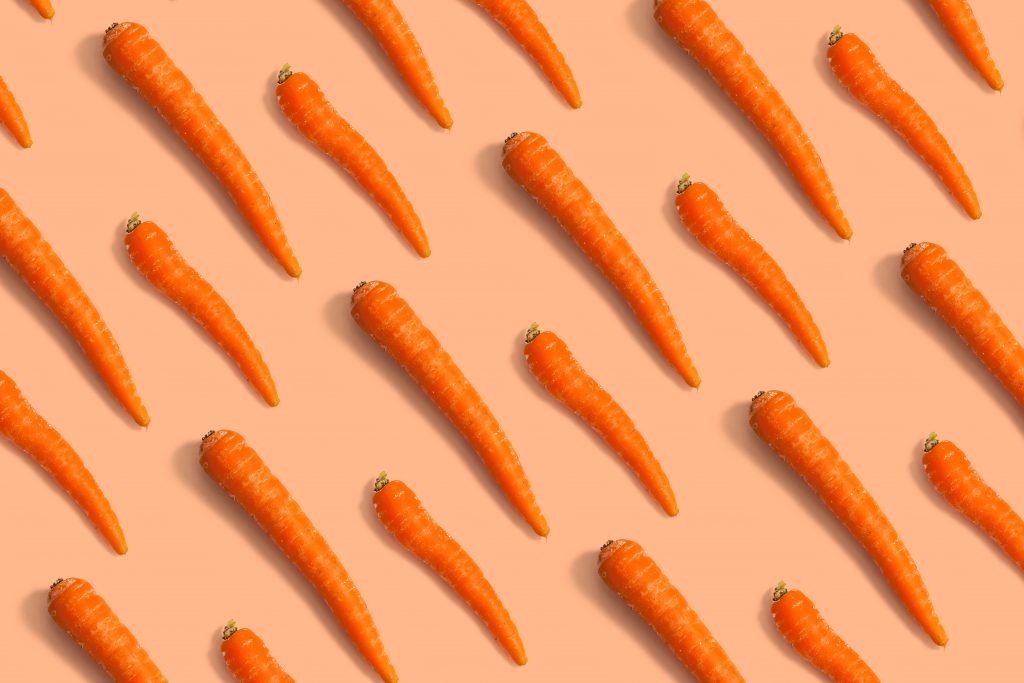Many know of carrots benefits but did you know that carrots are spooky? Or, at least they’re in the process of becoming so. Carrots have been growing wild in Europe since the middle ages. Given their wildness, it’s unsurprising that they have this mysterious reputation.
The myth surrounding them suggests they help keep you healthy and ward off evil spirits. This folklore has plenty of basis: Carrots contain a number of beneficial phytochemicals and vitamins which are essential for health – especially eye health! So if you haven’t tried them yet, read on to discover exactly why you should.

What is a carrot?
Carrots are a species of root vegetable belonging to the genus Daucus. Daucus means “dove” and is derived from the flowers of the plant. There are hundreds of varieties of carrot. They are all edible, but the orange-red carrot grown in the UK is most commonly used in salads and other dishes.
The carrot’s name is derived from “carum” which is Latin for “an edible root used in the making of medicine”. It is believed that the ancient Celts used carrots to reduce fever and protect against anemia.
Ancient origins of the carrot
The carrot is believed to have originated in Persia – the only country where it is cultivated. Native to the Mediterranean region, it was first cultivated in India and China. It was introduced to Europe in the middle ages.

What is the nutritional profile of carrots?
Carrots are a great source of Vitamin A and fiber, both being essential nutrients. Often claimed to be the perfect health food carrots benefits don’t stop there, 100 g serving of raw carrots has around 28 calories and provides 81% of the daily value for Vitamin A, which is 1210 IU.
It has almost no saturated fat or cholesterol and is rich in many essential nutrients like Vitamin C, beta carotene, potassium, copper, manganese and Vitamin K. The high fiber content in carrots also makes them an excellent choice for weight watchers.
Carrots contain about 10-15% protein, almost all of which is present in the form of essential amino acids. It is a good source of dietary fiber and potassium. It is also a good source of Vitamin C, Vitamin B6, Iron, Zinc, Magnesium, Copper and Manganese.
Vitamin A
Carrots are high in Vitamin A, which helps develop strong bones and teeth, prevents eye diseases and maintains the skin. Vitamin A is an essential nutrient, yet the human body does not synthesize it, therefore it has to be consumed in the diet. The daily recommended intake for Vitamin A is 700-900 IU per day for adults.
Carrots are among the best sources of Vitamin A. 100 g of raw carrots contains 1210 IU of Vitamin A. It is a fat-soluble vitamin, which means that it is absorbed and stored in the fatty tissues of the body. Carrots are also a good source of Beta-carotene, a precursor of Vitamin A.
Beta-carotene is converted to Vitamin A in the liver when needed. Hence, Vitamin A is available in the blood even when there is a deficiency of the same in the diet.

Summary
Carrots are high in Vitamin A, which helps develop strong bones and teeth, prevents eye diseases and maintains the skin.
Fiber
Carrots are a rich source of dietary fiber. Dietary fiber is a type of carbohydrate that is neither digested nor absorbed in the human gut.
It facilitates easy movement of the bowels and reduces the risk of colon cancer and heart diseases. You can try eating carrots to include more dietary fiber in your diet. 100 g of raw carrots contains 5.5 g of dietary fiber, which is nearly 20% of the daily recommended intake.
Summary
Carrots are a rich source of dietary fiber. Facilitates easy movement of the bowels and reduces the risk of colon cancer and heart diseases.
Potassium and Magnesium
Carrots are a rich source of Potassium, which is an essential mineral required for normal functioning of the body. A deficiency of Potassium in the body can lead to muscle cramps, heart diseases, stroke and hypertension.
Carrots provide around 236 mg of Potassium per 100 g of raw carrots. The recommended daily intake of Potassium for adults is 4700 mg.
Carrots are also a good source of Magnesium, which is required for muscle movement, blood pressure regulation and many other metabolic functions. 100 g of raw carrots contains around 30 mg of Magnesium.
Summary
Carrots are a rich source of Potassium, which is an essential mineral required for normal functioning of the body. Carrots are also a good source of Magnesium, which is required for muscle movement, blood pressure regulation
B6 and Copper
Carrots are a good source of Vitamin B6, a key nutrient which helps in the proper functioning of the nervous system and the metabolism of amino acids. Vitamin B6 deficiency can lead to anemia, developmental problems in children and increased risk of heart diseases.
The recommended daily intake of Vitamin B6 for adults is 2 mg. 100 g of raw carrots contains 0.21 mg of Vitamin B6.
Carrots are a rich source of Copper, a mineral required by the body for the healthy functioning of the immune system, red blood cells, nerves, bone metabolism and the breakdown of fatty acids. The daily recommended intake of Copper for adults is 1.5 mg. Copper is present in 100 g of raw carrots at a level of 0.29 mg.
Summary
Carrots are a good source of Vitamin B6, a key nutrient which helps in the proper functioning of the nervous system and the metabolism of amino acids.
Carrots are a rich source of Copper, a mineral required by the body for the healthy functioning of the immune system, red blood cells, nerves, bone metabolism
How to include more carrots in your diet?
Carrots are extremely versatile and can be used in various recipes. You can add them to smoothies, salads or even soups.
Carrots make an excellent addition to any baked dish like cakes, muffins or cookies. You can also make soups, stews or even curries with carrots.
To make Carrot juice, you can make use of a juicer or a blender. You can add carrots to your granola or even make fritters with them. You can also try making carrot halwa or carrot cake.
Benefits of carrots
While most people know that carrots are full of Vitamin A, there are many more amazing benefits of this delicious vegetable. Vitamin A is essential for healthy eyes, skin and immunity. It also contributes to bone growth and helps prevent infections. While Vitamin A is present in many fruits and vegetables, carrots are one of the few that are low in Vitamin C.
So while Vitamin A is a great aid to immunity, Vitamin C is essential for iron absorption – so you don’t want to miss out on it! Carrots contain beta-carotene, which can be converted into Vitamin A in the body. Vitamin A is essential for normal growth and development. It also helps maintain healthy eyes and skin by reducing inflammation and preventing dryness.

Carrots are an excellent source of Vitamin A and are known to be one of the richest sources of this essential vitamin. Vitamin A is an antioxidant and helps reduce the risk of certain cancers, like breast, cervical and oral cancers.
It is also helpful for eye health and can reduce the risk of macular degeneration. Another important reason to include carrots in your diet is that they are a great source of dietary fiber. Dietary fiber is helpful for maintaining a healthy digestive system and can prevent heart diseases and metabolic disorders like diabetes.
Carrots are also a rich source of Potassium, which helps lower blood pressure. They are also a good source of Vitamin B6 and Copper, two essential minerals required for a healthy nervous system and immune system.
Is it true that carrots help ward off evil spirits?
Like many other vegetables, carrots are believed to be a good luck charm. The belief stems from the fact that carrots are golden yellow and come from the “golden” soil of Persia. Crushed carrots are also used in witchcraft because of their ethereal qualities.
According to Romans, A fresh carrot can be worn as a charm for luck and good fortune. You can also make a lucky carrot necklace. First, grab a fresh carrot and slice it as you would for eating. You can even halve the carrot lengthwise to make it easier to eat. Next, stack the carrot slices together and tie the ends with a string. Next, hang the carrot from your front door and see if it brings you luck!
How to grow your own carrot seeds
To grow your own carrot seeds, you’ll need to collect some unwanted carrots from your grocer. You’ll want to collect a minimum of 10 seeds. Most grocery stores have a “donate food” bin that accepts seeds. If not, simply ask the grocer to donate any extra carrots they have.
Be sure to collect seeds from the outer edge of the carrot. These are the best as they will produce the longest carrots. To grow your own carrot seeds, simply place the seeds in a jar of water. The jar doesn’t matter since it will get tossed, but you’ll want to keep the seeds in a place that gets direct sunlight. You can also gently wash the seeds so they are completely free of any dirt.
Conclusion
Carrots have long been known as a healthy and beneficial vegetable. They are full of vitamins and minerals that are essential for good health. They are also a good choice for those with diabetes because they have a low glycemic index. Many myths surrounding carrots are untrue, but one thing is for certain: you should try them!


